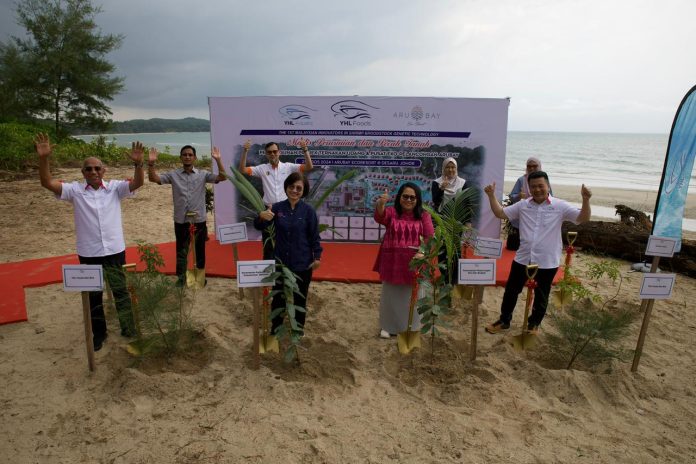YHL Food Sdn Bhd (YHL Food) celebrated a significant milestone with the official launch of Phase 3 of its Shrimp Farm Project, the groundbreaking ceremony for Phase 4, and the start of the Arubay Eco Resort in Desaru.
Dr Yasmeen Yasim, Deputy Secretary General of Tourism at the Ministry of Tourism, Arts, and Culture, officiated the event on behalf of Dato’ Sri Tiong King Sing, Minister of Tourism, Arts, and Culture.
YHL Food is YHL Group’s parent company, which specialises in integrated aquaculture of oysters, white prawns, and tiger prawns. Its operations include breeding, farming, frozen storage, genetic development, and breeding programmes.
YHL Food became the first local company to develop its own genetic strains and produce white and tiger prawn breeds, marking a significant achievement.
The aquaculture project in Desaru, which began in 2019, is YHL Group’s inaugural major venture.
Initially, through its subsidiary, YHL Aquatic Sdn Bhd, the company signed a Business Collaboration Agreement with Johor Biotech’s subsidiary Bio Desaru Sdn Bhd for the development of aquaculture operations on a 32-acre site known as Phase 1 and 2.
The primary goal in the early stages was to conduct research and development to identify the best farming practices for increasing production capacity and output.
With the successful development of high-capacity and more intensive farming practices, Phase 3 of the prawn farming project was completed and officially launched in June. This phase has significantly increased production capacity, adding approximately 1,440 metric tonnes annually.
The total output from Phases 1, 2, and 3 is expected to exceed 2,000 metric tonnes of prawns per year by the end of 2024.
Looking ahead, the prawn farming project will be expanded with the construction of Phase 4, which was commemorated by a groundbreaking ceremony. This phase is expected to be completed by the end of 2025.
Arubay Eco Resort, set to complete Phase 1 by mid-2025 and fully operational by 2027, is poised to become a major new attraction in eco-tourism in Desaru.
The resort will offer a unique vacation experience focused on environmental conservation and sustainability. Features include eco-friendly accommodations, Harvest-Bay for farming and aquaculture experiences, and Edubiz Leisure facilities for group activities such as meetings, courses, seminars, and event hosting.
Embracing the theme of Blue and Green, the YHL Group is committed to environmental preservation and sustainability in its development projects.
These colours symbolise tranquility and harmony between progress and nature, aligning with YHL’s motto, “Saving the Oceans Starts With Me”.
Datuk Mohd Khalil Bin Kader Mohd, Chairman of YHL Group, reflected on the significance of the day’s events, stating, “Today’s milestones are a testament to our vision of integrating sustainable practices within our core business operations. The successful development of the shrimp farming project and the launch of the Arubay Eco Resort underscore our commitment to not only driving economic growth but also creating lasting benefits for the community and the environment. We are proud to be setting new benchmarks in both the aquaculture and ecotourism industries”.
The development of Phases 3 and 4 of the Shrimp Farming Project, alongside the Arubay Eco Resort, will not only strengthen Johor’s position as a hub for aquaculture and tourism but will also serve as a model for sustainable industrial development in Malaysia.
Dr Yasmeen Yasim, Deputy Secretary General of Tourism, Ministry of Tourism, Arts, and Culture, remarked, “Arubay Eco Resort is expected to become a premier destination in Desaru, enhancing the region’s appeal as a top choice for nature-conscious travellers.
This development will blend tourism with environmental conservation and local ecology, offering a unique vacation experience and a diverse range of engaging recreational activities.”
With more than 300 job opportunities expected to be created through these projects, including training programmes for hospitality students from local institutions, this development will play a key role in empowering the local community and fostering talent development in the region.




